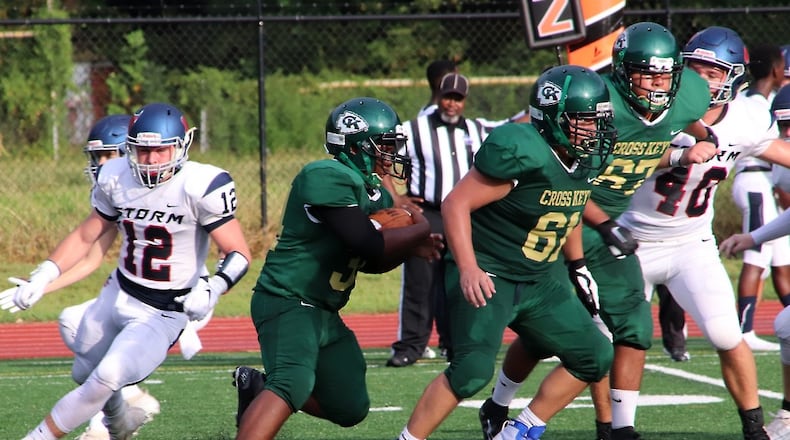Today's interviewee is John Bowen, who returned this season to Cross Keys - widely considered the toughest coaching job in Georgia - after leading Montgomery County to its first playoff victory in 31 seasons last year. It's not Bowen's first difficult assignment. In 1999, he was head coach at Glascock County when the Panthers broke a state-record 82-game losing streak. From 2005 to 2014, Bowen led Hephzibah to three of the five playoff berths in the school's 65-year history.
John Bowen, Cross Keys head coach
1. Too often coaches are judged by their wins and losses. Do you feel that does you a disservice, considering the places you've coached? "I don't apologize to anybody for my win-loss record. I know I can coach. I don't want to sound cocky, but I feel I can coach better than a lot of coaches who have better records. We proved that down in Montgomery County. Give us good athletes, and what we do works great. I would not say I have a calling to coach in tough situations. My calling is just the game of football, and you play the hand that you're dealt. That's the plug I've fit into in terms of openings. I've never chased money. I could've gone to bigger places as an assistant, but I didn't look for that. It wasn't important for me. It was about being where I needed to be for my family and football and going from there.''
High School Sports
2. You coached Cross Keys in 2015 before going to Montgomery County. Why did you return? "I grew up in the metro area, and I had a good assistant there in Montgomery County who was ready [Tim Suttles], so it was time. I'm back living in the same neighborhood where I grew up [in Conyers]. It's where I want to retire. I always liked the folks at Cross Keys. Yes, this is definitely the hardest job in the state [laughs]. My career path has been at places that weren't exactly powerhouses. My goal here is to teach the game of football, be a better teacher and bring the game to an entirely different culture. The school is probably 95 percent Hispanic. I want to show that we can grow the game here and take it seriously and make it popular."
3. What are the challenges here compared to a place like Glascock County? "At Glascock, it was more of a population problem. We only had 50 boys in the entire school and sitting in a region with Lincoln County, Washington-Wilkes, ECI and Putnam County. So when you take 15 kids to Lincoln County in their prime, it's tough, and when you lose, it becomes not the popular thing [for students in the school] to do. We won games there. Not many [six over his last three seasons], but they're still playing football games there instead of shutting it down. It shows that instead of giving up on it, football can still provide fun and excitement for a community.
"At Cross Keys, football is not big in the culture of the students. You have a language barrier to some extent. The history is bad in football, and once the momentum goes against you, it's hard to get it turned around. And there's a size disadvantage, not just the size of the roster - we've got 31 kids right now - but the size of the players. We've got more under 135 pounds than over 200. We've got one player who can bench press 215 pounds."
4. What's realistic at Cross Keys, and what do you hope to achieve? "We've taken football seriously no matter where we've been and made it better. We've done things right, taught the game of football, and we've created football fans in places that never would've had them if we hadn't kept such a positive outlook through adversity. I think we can check all those boxes everywhere we've been. Whether you're taking over an average, struggling or great program, you can make it better. That's what we're trying to do here. In the short term, just get better day by day. I'm not a big Nick Saban fan, but I like his quote about the process - block out the distractions and focus on getting better each day. You can get better every day at some phase of the game. Long term, I want to get excitement going and make football a popular thing to do. Once we get more players, you get some competition going, and you get better. It's a long climb up the mountain. We've got a million steps to go, but we're taking them one day at a time."
Produced by Georgia High School Football Daily, a free e-mail newsletter. To join the mailing list, click here.
About the Author

